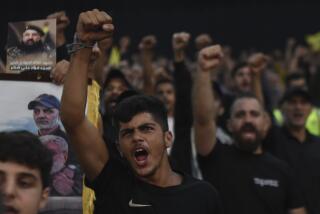Welcome to Assassin-istan
- Share via
The recent assassination attempt against President Hamid Karzai has triggered an avalanche of comment on how far Afghanistan is from achieving normality.
Taliban supporters call it a sign of Washington’s failure in Afghanistan. Those who wish to drag the U.S. into empire-building games in Central Asia have used it to argue for greater American military involvement.
Yet the truth is that, by Afghan standards, the situation is as normal as it could get.
Afghanistan has always represented a patchwork of tribal communities that first came together in the 18th century, acknowledging the nominal authority of a distant shah, or king, in Kabul. The idea was that the different communities would be autonomous in their territories but would unite under one banner to oppose foreign invaders.
Trouble among the communities broke out only when Kabul tried to exercise real authority. In such cases, the crisis would come to an end with the eviction or murder of the interventionist king. In the last two centuries, two Afghan kings have been murdered and three more deposed.
Rulers in post-monarchist Afghanistan have fared even worse. From 1973, when the last king was driven into exile, to 2001, Afghanistan has had eight rulers. Of these, four were murdered and two were driven from office by force. One was saved by the Soviets at the last minute because he had been an agent of the KGB. The last, Mullah Mohammed Omar, is being hunted by U.S. and allied troops.
To this list must be added the murder, just two days before last year’s Sept. 11 attacks, of Ahmed Shah Masoud in his stronghold of Panjshir. Though he never became head of state, for almost two decades Masoud symbolized Afghan resistance, first against the communists and then against the Taliban. His murder was the curtain raiser for the attacks on New York and Washington.
Masoud was not the only prominent Afghan leader to die at the hands of assassins. A list of tribal, political and religious leaders who have been murdered by opponents in the last decade reads like an Afghan who’s who.
Afghan normality is under threat not because of assassination attempts that have always formed part of the Afghan political norm but rather because of attempts at altering the traditional status of Afghanistan as a buffer state surrounded by rival powers and making it instead a foundation for U.S. global defenses. Such attempts are bound to provoke negative reactions from Iran, Russia, China, Pakistan and even India.
A second threat to normality in Afghanistan comes from the mistaken notion that money and American military support could transform Afghanistan into a centralized state controlled by a small elite from Kabul.
One other factor complicates the situation. Karzai is supposed to be a transitional leader whose principal task is to supervise the writing of a new constitution, the holding of a referendum to approve it and, eventually, the organization of elections.
Karzai, however, has persuaded the U.S. to help him create a new national army, something that has never worked in Afghanistan. He has insisted that the $5 billion in foreign aid promised by the U.S. and other countries should be channeled through Kabul, giving the capital a clout it has never had before. And he has played the ethnic card, creating the impression that the new U.S.-backed leadership of Afghanistan will be predominantly Pushtun.
Despite occasional acts of violence, Afghanistan is now experiencing a peace and normality that it had not known for almost 30 years. And that is to a large measure thanks to American intervention, for which a majority of Afghans say they are grateful.
But the same Afghans resent any attempt by Washington to intervene in their domestic politics to alter the delicate arrangements that have kept that “land of insolence,” as Muslim literature has called Afghanistan, under one flag for more than two centuries.
As Muslim historian Abbas Iqbal wrote: “It is when a conqueror has achieved complete victory in the land of insolence that he is most in danger. The tribes gradually turn him into another tribal chief and fete and honor him. And then one day, they will slit his throat.”
*
Amir Taheri is editor of Politique Internationale quarterly in Paris. E-mail: amtaher@aol.com.
More to Read
Sign up for Essential California
The most important California stories and recommendations in your inbox every morning.
You may occasionally receive promotional content from the Los Angeles Times.













